Today we celebrate the FIVE YEAR anniversary of the podcast. Whoa. To celebrate, I reached out to every single person who you’ve ever heard on the podcast — every expert, every voice actor, and even a few patrons — and asked them one question: what would you say to someone living 50 years from now? Here’s what they said:
Guests: Alice Wong, Amy Slaton, Angeli Fitch, Arielle Duhaime-Ross, Ashley Shew, Avery Trufelman, Calvin Gimpelevich, Carl Evers, Chris Dancy, Damien Patrick Williams, David Agranoff. Ernesto D. Morales, Gina Tam, Janelle Shane, Janet Stemwedel, Jared Dyer, Jon Christensen, Kathy Randall Bryant, Katie Gordon, Kelly & Zach Weinersmith, Lina Ayenew, Matt Lubchanksy, Meredith Talusan, Michelle Hanlon, Morgan Gorris, Naomi Baron, Natalia Petrzela, Sandeep Ravindran, Queer Futures Collective, Sav Schlauderaff, Shoshana Schlauderaff, Zia Puig, Zoe Schlanger
You can read all their answers in full HERE.
Flash Forward is produced by me, Rose Eveleth. The intro music is by Asura and the outtro music is by Hussalonia. Additional music this episode from Chad Crouch, Ketsa, Xylo-Ziko, and Loyalty Freak. The episode art is by Matt Lubchansky.
If you want to suggest a future we should take on, send us a note on Twitter, Facebook or by email at info@flashforwardpod.com. We love hearing your ideas! And if you think you’ve spotted one of the little references I’ve hidden in the episode, email us there too. If you’re right, I’ll send you something cool.
And if you want to support the show, there are a few ways you can do that too! Head to www.flashforwardpod.com/support for more about how to give. But if that’s not in the cards for you, you can head to iTunes and leave us a nice review or just tell your friends about us. Those things really do help.
That’s all for this future, come back next time and we’ll travel to a new one.
FULL TRANSCRIPT BELOW
▹▹ ▹▹ ▹▹ ▹▹ ▹▹ ▹▹ ▹▹ ▹▹ ▹▹ ▹▹ ▹▹ ▹▹ ▹▹ ▹▹ ▹▹ ▹▹ ▹▹ ▹▹ ▹▹ ▹▹ ▹▹ ▹▹ ▹▹
Rose Eveleth: Hello and welcome to Flash Forward! I’m Rose and I’m your host. Flash Forward is a show about the future. And this is a very special episode. Today, May 12th, is the exact five year anniversary of the show. Five years ago today, I clicked “Publish” on the first ever one of these things. I had no idea if anybody would listen, I had no idea if I’d do ten more, let alone over a hundred more. And now, here we are! Flash Forward is five. According to the CDC’s “important milestone” checklist that means that the podcast should currently:
Want to please friends: Check
Like to sing, dance, and act: Check
Be aware of gender: Yeah, check.
Be able to tell what’s real and what’s make-believe: Eh, we’re still working on it, but we’re getting there.
Be able to draw a person with at least 6 body parts: Sure, yeah, I think that we have covered at least six body parts on this show.
And be able to use a fork and spoon and sometimes a table knife: Sure, I’d say sometimes we pull out the knife, but mostly we’re a fork and spoon kinda show.
So there you have it, a healthy five year old podcast baby!
I won’t get too sappy just yet; I’ll save that for the end of the episode, but I do want to say thank you to every single person who has ever listened to or supported the show in some way. Whether this is your first ever episode, or your 109th; whther you’ve been a Patron for years, or you’re just getting into the show; whatever stage of Flash Forward life you’re in: thank you. Every eardrum that vibrates with the sound of this show, or eyeball that reads the words from the transcript, collectively, piled up into a totally not gross pile, is what makes Flash Forward possible, that very fleshy pile.
So! To celebrate five years, this episode is gonna be a little bit different. I know, long time listeners are probably shocked to hear that; I often do these weird episodes for milestones. Normally we travel to the future and then travel back to today to talk to experts, you know the deal. But for this episode I really wanted to try and reflect on the last five years, and think about the future at the same time. I was thinking about how I could gather up the collective wisdom of the show and try and reflect it forward. To figure that out, I reached out to every single person who you’ve ever heard on the podcast — every expert, every voice actor, and even a few patrons — and asked them one question: what message would you send to someone living 50 years from now?
And today, you’re going to hear their answers. If this is the first ever episode of Flash Forward that you are tuning into, I mean, I can’t tell you what to do, but just know that this is really different from all of the other episodes. You’re about to hear a sound collage, a mixtape of sorts, a sort of Golden Record of Flash Forward. If this is your first ever episode of Flash Forward, I may gently suggest starting with a different one, because none of the other episodes sound like this. Or you can listen to this one then go back to the other ones. I can’t tell you what to do; live your life. You do you.
Two final notes before we get to this little experiment. One: there are exactly three curse words in this episode. Normally Flash Forward is clean for teachers, and students, and parents to use, but this time I let folks get a little wild for the five year anniversaty. And two: this is not a coronavirus free zone. Lots of people wanted to talk about the pandemic, so you’re going to hear about it. Okay… buckle up. It’s about to get weird.
[music up]
Carl Evers: Dear future, I wish you Godspeed.
Matt Lubchanksy: Hello, people of 2070.
Jared Dyer: Hi, Rose and Future People.
Zia Puig: Hola, mis amores.
Alice Wong: First off, I want to say hello to all the cyborgs, mermaids, humanoids, aliens…
David Agronoff: Dear person in 2070.
Janelle Shane: Oh, hello, this is Janelle speaking to you from the past. And I guess the first thing I want to say is sorry for what we are doing to set you up for some pretty bad situations, probably, in the future.
Zoe Schlanger: I’m really, really sorry.
David: I realize that people in your year probably don’t have many warm feelings for those of us living through 2020. I promise it is not our favorite year either.
Zoe: I’m sorry that there are probably hardly any insects or amphibians left and that you’ll probably never be able to see a coral reef. Those were really cool.
Ashley Shew: All right. And you know, in 50 years, you’ll be fifty nine. What message would you like to send to someone living 50 years from now?
Daughter: I would ask if we’re still protecting the planet, because that’s one of the most important things in the world. I’d wonder if there are going to be as many trees in there, or if species that have lived while I’m a child have gone extinct.
Ashley: There probably will be.
Daughter: Yeah.
Zoe: It’s been 100 years since the first Earth Day and so many of the things that existed then likely don’t exist for you now. Lots of species, but also whole places, rivers, rainforests and those reefs. I’m seriously so sorry.
Ashley: Is there anyone you want to say to someone fifty years from now about these things, maybe someone your age — which is eleven — in fifty years will be sixty one then?
Daughter: I would tell them to protect what little nature they have left, if there is little left. And we have a lot left because people have taken a stand to make sure to protect it.
Ashley: What do you like most about nature?
Daughter: I like the fact that it’s always changing, it’s always in constant motion.
Ashley: Just like you.
Daughter: Yeah.
Ashley: Love you. Thank you.
David: I am sure the general attitude you have towards us is bewilderment. Why didn’t you change? Why didn’t you do anything with the science when it was so clear?
Gina Tam: For people in 50 years who look back on this time, I hope they’ll realize how many people see injustice and violence around us and want to change it, and have no idea how.
Matt: But mostly I’m very sorry, truly sorry that we didn’t do more.
Amy Slaton: I’d like to take this chance to not say sorry.
Some of us knew that there were even bigger problems in 2020 than the cruelties of the for-profit health care system. That the stuff — the cars, the yoga mats, the smartphones, the insta pots, the bacon burgers — were killing the planet. And that producing and distributing the stuff meant really awful lives for lots of people at the time, and probably ensured awful lives from people well into the future, that is into your time. But we bought them anyway. We knew what they meant, and we didn’t stop. We didn’t elect the people who had better ideas. We didn’t resist. And I’m not saying sorry. To say sorry is a comfort. And the possibility of comfort — of being forgiven for the consequences of our action — is the problem in 2020. So I’m rejecting the chance to say sorry to the folks of 2070. Instead, I’m aiming to start making the right choices. So that’s all. Hope you’re safe. Hope you’re healthy. Hope there’s still hope. Thanks.
Kelly Weinersmith: Hello, People of the future. This is people of the past. You may have reasons to believe we were not a very smart people, in the past. First of all, how dare you? That’s a common stereotype. Second, it’s wrong. We’ll prove it by perfectly predicting life in the year 2070. In these days of the coronavirus pandemic, a lot of people make irresponsible, even dangerous, predictions about the future. This is because they propose all sorts of wild developments, instead of simply extrapolating from current trends. In order to say nothing wrong, we will only be extrapolating from the most up to date available data.
Zach Weinersmith: First trend: home bread production has roughly tripled in the past month. If we continue tripling over the next 600 months, we find bread creation per person will increase 216 million fold. Loosely speaking, that puts us at 10 billion loaves of bread per person per year. Or, approximately enough to coat the planet in bread to a height of 50 loaves by the year 2070. The good news is that hunger has been solved. The bad news is many people have probably choked to death in the sea of quote unquote, artisan style baked goods.
Kelly: Second trend: Liquor sales are up. As a first estimate, we found an article saying that people in Dayton, Ohio, were observed carrying armloads of liquor coming out of the grocery store. Having been to Dayton, Ohio, we estimate that the average Daytonian only requires one fistful of liquor per grocery trip. We conclude that the new trend is a quintupling of liquor consumption every month. And we believe these results can be extrapolated to all humanity, because Ohioans are incredibly, incredibly average. By the year 2070 we find a 100 trillion fold increase in per capita consumption of spirits. If we assume population continues growing, despite certain dietary trends, we find seven septillion gallons of liquor must be created per year. Enough to replace Earth’s oceans several million times. By the year 2070, Earth will be like Saturn’s moon Titan. Only instead of water, we will have one massive subsurface Long Island Iced Tea. And the surface crust will literally, actually, be crust.
Zach: Third trend: to satisfy the monthly octupling of toilet paper demand, all plant life has been converted into gentle, yet resilient, three ply squares. These are now soaked in ethanol and highly flammable. Once these catch fire they will burn for a few years, only finally going out after they’ve completely exhausted Earth’s oxygen supply, which will not be replenished because no plants remain. And because the sky is now an impenetrable shroud of smoke.
Kelly: Will humans survive in a world deprived of sunlight and oxygen, with little contact with other living beings, and with vast liquor consumption on a constant basis? I can say confidently, from the year 2020, that we will. In fact, we will thrive.
Zach: Fourth trend: Adaptation. Given the quantity of people who are now home, and who have exhausted the entire libraries of Amazon and Netflix, we expect a factor of 10 increase in baby making. That takes us to a worldwide fertility rate of 24 children per woman. This creates a population doubling time of about three years. The happy result is an enormous number of humans for natural selection to select against, until we are whittled down to only those beings who can survive in a state of perpetual carb loading and inebriation. The sloshed will inherit the Earth.
Kelly: That is our prediction, drunken fish people of 2070. Please know that from our vantage here in the dark days of 2020, we never lost hope. Though we are sad to have missed out on Utopia.
Michelle Hanlon: The message I would like to send someone living 50 years from now is very simple. 42. Thank you.
Kathy Randall Bryant: Hi, my name is Kathy Randall Bryant. I’m a pastor by training. But right now I’m the Full-Time caregiver to my two girls. To Rebel and Roar; now that you are 54 and 52 respectively. First, I hope you are well, I hope you are still able to laugh with your full bodies, the way you did today. I hope you can go outside and smell the green of spring, the gold of summer, the burnished red or fall, and the white of winter. I’m sorry for mistakes I’ve made, and the assumptions I’ve held, even as you teach me new ways of seeing the world. Keep teaching me, and those around me, better ways of understanding what we have now. I look forward to seeing your face again, and I can’t wait to see what experiments you share at your table. I love you, Mom.
Sandeep Ravindran: Here are some haikus to someone 50 years from now:.
If you can hear this.
There’s still hope for humankind.
to maybe fix this mess.
We dreamed of jetpacks.
And flying cars but the
Internet’s better.
I wonder what tech.
Will be awesome yet mundane.
50 years from now.
Thank you.
Avery Trufelman: Okay, so I’ve been thinking about what I want to tell someone 50 years in the future. And unfortunately, the advice I wish to relay is not poetic, or smart, or timeworn, or anything. I don’t feel like I don’t have anything that I could teach the future. I feel like all that I can do is document; or attempt to document the moment we’re living in.
Natalia Petrezela: As a historian, often the hardest thing to recapture when we’re chronicling the past is how people felt at a particular moment. Not the policies they made, not what got reported in the newspaper, but how people felt.
And so I just want to use these couple of minutes to talk about the way I feel right now, and the way I think a lot of other people are feeling about the moment that we’re in.
Amy: The first thing I want to tell you there in 2070 is that whole bunch of photos that you see from the early 2020s, when we all have terrible looking hair, and look like we’ve been crying a lot? Those are from the pandemic
Zia: I am recording this message after more than a month of quarantine because of the COVID-19 Pandemic.
Janet Stemwedel: I’m sheltering in place near San Jose because we’re in the middle of a global pandemic.
Jon Christensen: Yesterday was again the worst day yet in Los Angeles, where 81 people died.
Queer Futures Collective: We are being treated as disposable. No one is looking after us. No one is going to work to make this easier for us.
Natalia: One of the things that historians often wonder is: Did they know? Did they know they were living through a transformation? And it’s not all that often that it seems that people did know and did feel, wow, things are really changing. But also, it’s hard to have the sources to actually assess that awareness or not. So, I’ll tell you right now, it does seem like we’re living through a history.
Janet: And I want to say, hey, to the humans in 2070; 50 years from now. No part of what’s happening for you now was inevitable.
Avery: And I feel like the message I want to say to people living in the future is that, um, how do I put this? I can so vividly imagine a future where everything gets wrapped around the Coronavirus outbreak. I feel like, as an old lady, I’m going to be correcting people all the time. Like, no people were using viral before. That was a thing. Screens were also already a thing. We were already devising ways to avoid each other, and have food delivered to our doors. And society was already extremely rigidly striated, and it was already really hard to live, and get by and that the coronavirus really only drew these things into stark relief.
History moves… history is very queer. Or, I guess time is very queer. Both things can be true at the same time. Nothing just happens instantaneously.
Gina: If I were to send a message to someone 50 years in the future, I would ask them to learn the right lessons from history. I think it’s really natural to look to the past for guidance when we see uncertainty, and oppression, and violence all around us. And we look for patterns, which is a good thing to do. But oftentimes we will fix ourselves onto a particular analogy. And I think that that will often blind us to the kinds of oppression and violence that are happening around us. It really narrows our view.
Jon: As an environmental historian, I believe history should be useful for the present and the future. And I’d like to take this occasion to send one reminder to students in the future, fifty years from now, in the year 2070. Remember this: shit happens. Or, to put it more politely, contingency matters.
Gina: What I mean by saying we should learn the right lessons from history; I think we should remember that exact moments in the past never repeat themselves. And by presuming that they will, we blind ourselves to tragedies that unfold right before our eyes.
Jon: Some might even say that contingency — that unpredicted stuff happens — is really the only domain left that historians are uniquely trained to try to understand, explain, tell stories about.
Gina: By looking for perfect metaphors and analogies to the past, we lose sight of how millions and millions of guises violence and oppression can take, and how it can transform, and how it looks like something different, even if the same kind of oppression and violence is still happening. And when we spend all of our time looking for something exactly the same as the past, we end up ignoring it, or even legitimizing it, right? Or arguing over the accuracy of our analogies.
Jon: We really specialize in what the models can’t explain. That shit happens. That history matters.
Gina: It’s not that the past has nothing to teach us. It teaches us the multiple guises in which violence, oppression, can happen and how we legitimize, explain away, downplay or wipe from memory as it is happening in real time.
Jon: Think of a classroom in a university. I hope you still have those in 2070. It is filled with seats equipped with a writing surface for taking notes. The seats all face a lectern at the front. That is structure. From the configuration of the classroom to the organization of the whole university. Now the students file in, sit down and take notes, as a professor stands at the front of the room and lectures. That is reproduction. Together we are all reproducing the structure of the university, year after year. And what about agency? You as a student have some agency. You chose to learn this subject, presumably to shape your own future. You could attend or skip class today. I, as a professor, have some agency too. I can choose how to teach this course, but teach it I must, to keep my job. And then, suddenly it is all over. On the last day of class, the classroom sits empty. No students, no teacher. A viral pandemic, abetted by an inept government response, led by a corrupt, idiosyncratic president, has changed everything. That’s contingency. Shit happens and that can change your future.
Avery: Oh, my God. Five minutes. Sorry, I’m turning into my mother, leaving these rambly voice messages.
Ernesto D. Morales: Dear 2070. You may be 50 years closer to the complete optimization of daily life, but you still stand to gain from a relationship with your past, specifically with the humble corporation by the name of Object Solutions. Divided by time we may be, but united we stand in the goal to streamline humanity into a seamless consumer experience. You may have more advanced technology, bigger data, but we still have that lucrative connection to the human soul. To that end, I slide my proposal across the tables of time. Object Solutions invites you to a formal meeting at our headquarters, fifty years ago today.
With our guidance, you can have access to a society that’s still separable from artificial intelligence. These days, if you try hard enough, you can still get a human on the phone. You can still truly know yourself, and connect with others, with only minor guidance from an app. Personally, I have more close friends than I do smart devices. But that time is fading fast. It’s a perfect opportunity for you to capitalize. I’m not talking corporate merger. They could step on some butterflies. But let’s call it transactional time travel. Object Solutions is poised to be the corporate steward for the future you wish you were.
I think you’ll find a lot of opportunities in this time period. 2020 is not too early, not too late.
Chris Dancy: 2070. hello. I think a lot about you. First, let me say, while you’re probably caught up in all the nostalgia that’s everywhere you look for the 2050s. Let me tell you that you were living in one of the best of times, right now here in 2070. How do I know? Well, sit down. You’re probably not gonna be ready for this. I’m living here in the year 2370. Yep. That’s almost 300 years into your future. I’ve read a lot about your century, and specifically your decade.
So let me answer a few questions for you before I go. Our time is really limited when we send these transmissions back.
So, first question. Yes, humans finally do leave Earth. We actually build that home on Mars we were promised. And not the temporary, crappy, one we got in 2030. No. A real one, the one like we were promised after the great American collapse of 2052.
And no, we don’t conquer death in the future. You see, as you remember, after the first full time BCI, or brain computer interface recipient, was attached to A.I. to form our first hybrid intelligence in, I think, 2046, we thought that would be it. Having people inside A.I., with all their memories, hopes and dreams would create a new place for us to live. Unfortunately, sometime in your next 40 years, I think around 2112, we find out that mortality is part of a system of sorts, that functions outside of our worlds, outside of our consciousness. It kind of keeps a cosmic order. It’s important.
So it might seem scary. Times have that effect on people. The world is really divided. And we’ve seen this before. Our ability to dream, be lost in thought, have nightmares or even just wonder out loud something when we’re alone. That was our first glimpse at what it was like to tap into this river of time. Here in the future, we all have the ability to change, not only the future, but our current moments. We’ve learned that using this feeling of daydreaming and hope has a way of reshaping our reality. We even have a term for it. It’s called Flash Forward. It’s kind of magical, and we don’t use the term magical lightly.
Take care. See you soon.
Meredith Talusan: This is my message to any minority who feels oppressed in 2070. I know that people might be telling you that there are more important things to worry about, that the environment is wreaking havoc on us, that there might be a new pandemic, that there are threats from nature, all across the planet looming. But don’t let those people deter you from understanding that human problems are still problems that need to be solved. And that whatever sufferings the rest of the population have are sufferings that you also experience and more.
Janelle: I just listened to a climate scientist of today crying, because she knew how bad the situation was, and wished she could do more. And I think there’s a lot of us like that. And it may help to have that picture of humanity of our time, humanity of our past, as not being monolithic, as being a lot more nuanced and a lot smarter than sometimes we give the past credit for. So, I hope you, in the future, are also doing weird, smart, bizarre things that we in the past have not even possibly imagined. That is the beauty, and the complexity of the history of humanity. So, hello from one part of it to another part of it.
Queer Futures Collective: In fifty years I hope that time is held more gently, stop the rushing, stop the overwhelming noise. Return to our gentle state.
Arielle Duhaime-Ross: My hope for 50 years from now is that people won’t want to hold on to power as much as they do now.
Matt: I hope you exist, and if you do, I hope the entrenched opposition to the people trying to build a less cruel world have been overthrown, or otherwise destroyed.
Naomi Baron: I hope that Covid-19 is only a story you heard from your grandparents.
Arielle: My hope is that society will be more open to sharing power, and sharing thoughts and ideas, because they will have seen what people in this current age have gone through.
Zoe: Maybe by 50 years from now we’ll have learned that every time we lose one of these things, we’re losing too.
Queer Futures Collective: We hope that knowledge is free and accessible. That institutions stealing ideas, and enslaving their workforce are brought down, that no bodies are treated as disposable.
Lina Ayenew: What I hope for the continent of Africa, and my country, Ethiopia, is that 50 years from now we embrace both our identities, our languages, and science and technology.
Katie Gordon: I hope that you’re listening to this at a time where you can talk freely about your emotions, your thoughts, and your struggles with no stigma attached.
Queer Futures Collective: That communal knowledge is recognized for the power that it has, and that it is prioritized.
Damien Patrick Williams: I’m hoping that 50 years from now, you’re looking at the lessons that we’ve been trying to learn for the previous 50 years, and the 50 years before that, and the 50 years before that, and you’re thinking about them as places where we had good intentions, but had not yet reached meaningful execution. I’m hoping that you’ve built on that as much as possible.
Queer Futures Collective: In fifty years, I hope to see a world anew. Living in old age, a hardened soul, and a softened heart. Living in the gentle springtime breeze.
Alice: May you treasure the oracles that are in your communities right now, and I hope you listen to them with an open spirit and heart.
Damien: Hopefully 50 years from now, everything that I’m saying is second nature and you’ll just go, well, yeah, of course.
David: I hope people will listen. But I also understand, on a deeper level, if you are there to receive this letter, then people must have changed. 2020 has been a challenging year, and my hope is — and you would know better than I would — that the people of my time realize how easily they can lose everything.
Queer Futures Collective: We don’t always get it right, but we keep on trying.
And maybe that is because of hope. I hope that you are still trying to, even when you don’t get it right. I hope that you are still asking for what you need. I hope that you’re listening. I suppose what I would want to tell you is that we loved, and cared, and listened, and supported each other. We didn’t always get it right, but we kept trying.
Zia: There is magic around. Can you feel it—or is it just me? It is fuzzing between us, glowing among us, materialized through us, existing within us.
Can you feel it—or is it just me?
We are alchemists of change.
Look around. For real, look around…
It is important to pause, to remember these days. Write about them: breathe them. These days that are weirdly giving to many of us, so much pain and so much lucidity—all at once. Honor what we have pulled together. Honor what we have survived. Honor the magic of your body, of your mind, of your spirit, of your heart: Did you know you were this wise? Isn’t it obvious that we chose each other before? Isn’t it evident that we have known each other many times, that we have changed worlds together already—that we are made of magic stuff? I feel in my heart I have looked into your eyes another time. I know your soul from before. Somewhere else: we have hugged each other somewhere else.
Look around, this is it. Our elders are with us, holding our hands. Our ancestors, the souls who take care of us, que nos cuidan with their love, who keep us alive, grounded en la tierra and in the sky: They are with us. Can you feel it—or is it just me? There is no~thing out of reach: and this is not a fucking metaphor. We can expand ourselves across erased histories.
We are the ones: The One who imagine and make universes whenwhere stars sparkle with care, kindness, love, and solidarity for all deemed valueless by systems of dispossession, exploitation, and extermination.
Look around. We are the energy that nurtures any possible transformation. We time travel—transcending the im/possibilities of the present. We are the shapeshifters of the cosmos. We are alchemists of change.
Alice: Smell ya later…..
Rose: Okay, that is this trip to the future. I’ve been thinking a lot about what I can add here at the end. Like, what I can say that hasn’t already been said. What I want you to know that you didn’t already just get from all of that. And, I guess the thing that I want you to know is the same thing that I want people in my time, 2020, to know. Which is that the future hasn’t happened yet. I know this sounds ridiculously obvious, but I think it’s worth remembering. The future isn’t a forgone conclusion, it’s not decided. And even though it can sometimes feel this way, it’s not entirely out of your hands.
The stuff I do today is going to change your lives, in your time, at least a little bit. And you, listening to this in 2070, which I hope you are, can do things that will change the lives of people in 2075, and in 2120, and beyond. You can change their lives for the better, or you can change their lives for the worse. It’s not like we’re all on a train, on a track. It’s like there’s an open field, and you’re riding this wild monster that we’re all trying to wrangle. Movements are built by people. Moving the future happens because people want it to, and figure out the places to poke and the ways to pull to make that happen. So, you can be one of the people who pulls on those reins if you want to be. So that’s my message: the future hasn’t happened yet. Which is a really good thing, actually.
A huge thank you to every single person who sent in audio for this. I couldn’t include everybody, and I cut a lot of stuff down into shorter bits, as you heard. So if you want to read or hear the full list of what everybody said, you can find that at flashforwardpod.com, which includes:
Alice Wong // Amy Slaton // Angeli Fitch // Arielle Duhaime-Ross // Ashley Shew // Avery Trufelman // Calvin Gimpelevich // Carl Evers // Chris Dancy // Damien Patrick Williams // David Agranoff // Ernesto D. Morales // Gina Tam // Janelle Shane // Janet Stemwedel // Jared Dyer // Jon Christensen // Kathy Randall Bryant // Katie Gordon // Kelly & Zach Weinersmith // Lina Ayenew // Matt Lubchanksy // Meredith Talusan // Michelle Hanlon // Morgan Gorris // Naomi Baron // Natalia Petrezela // Sandeep Ravindran // Queer Futures Collective // Sav Schlauderaff // Shoshanna Schlauderaff // Zia Puig // Zoe Schlanger
Phew. The music you heard in this episode is by Asura, Chad Crouch, Ketsa, Xylo-Ziko, Loyalty Freak and Hussalonia.
To celebrate five years of Flash Forward I’m doing a video AMA, where I’m going to answer questions that people have about the show. I gathered those on Pateron and social media networks for Flash Forwad. so be on the lookout for that, you’ll be able to find it on our social media pages which are pretty much always @flashforwardpod.
I would be absolutely remiss if I didn’t spend some time in this five year anniversary episode thanking a few people who helped make Flash Forward’s five years possible. First, thanks to Annalee Newitz, who first commissioned this podcast in its original form when it was called Meanwhile in the Future. Thanks to Quinn Heraty who has helped with a million different legal and business things to keep the show funded and afloat. Thanks to Amanda McLaughlin from Multitude, who keeps the ads coming for the show which keeps the show going. And thank you to every Patron and donor, who really truly keep the show afloat. And to you, who’s still listening to the outro to an episode.
Flash Forward is produced by me, Rose Eveleth. The episode art is by Matt Lubchansky, as always. We’ll be back to regular programming in two weeks, where we’re traveling to a really fun future that I’m really excited about.
If you want to suggest a future we should take on, send us a note on Twitter, Facebook or by email at info@flashforwardpod.com. We love hearing your ideas! The next episode, the one that comes out in two weeks, is a listener suggestion. And if you think you’ve spotted one of the little references I’ve hidden in the episode, email us there too. If you’re right, I’ll send you something cool.
And if you want to support the show, there are a few ways you can do that too! Head to www.flashforwardpod.com/support for more about how to give. But if that’s not in the cards for you, you can head to Apple Podcasts and leave us a nice review or just tell your friends about us. Those things really do help.
Okay, that’s all for this admittedly, somewhat strange episode. Come back next time, and we’ll travel to a different future.

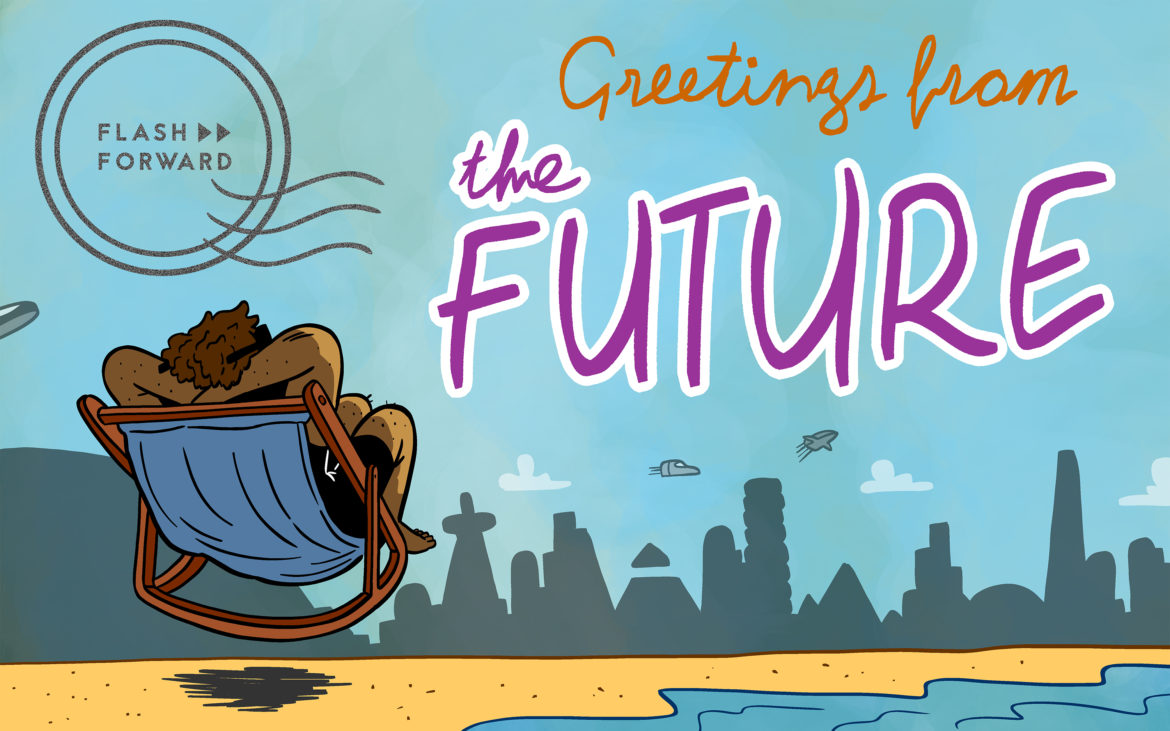
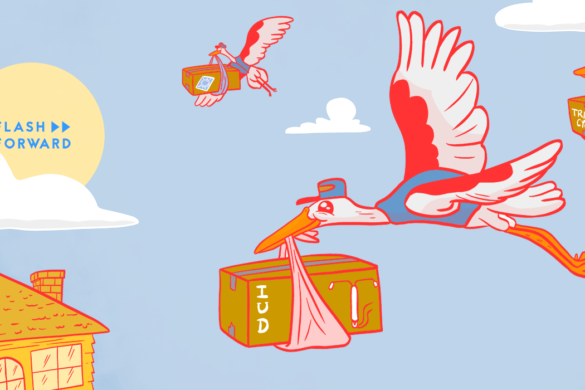
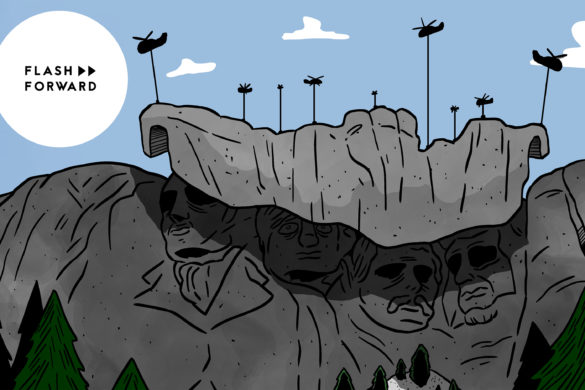
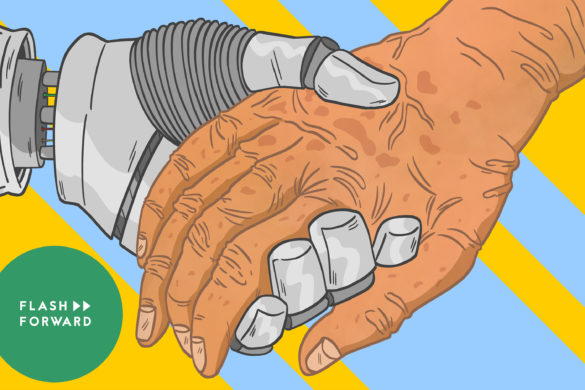

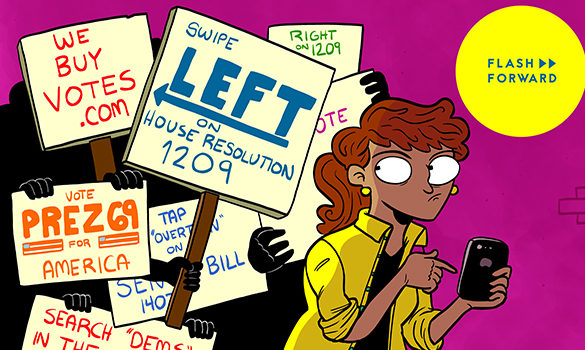
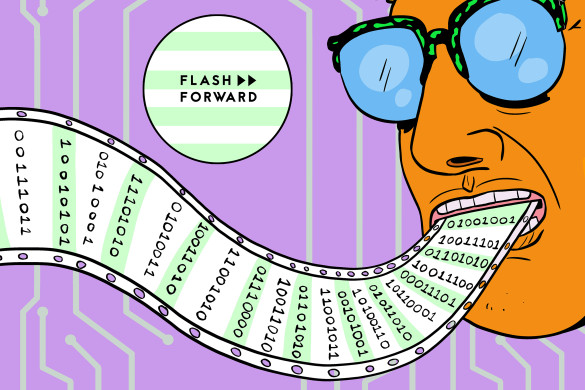
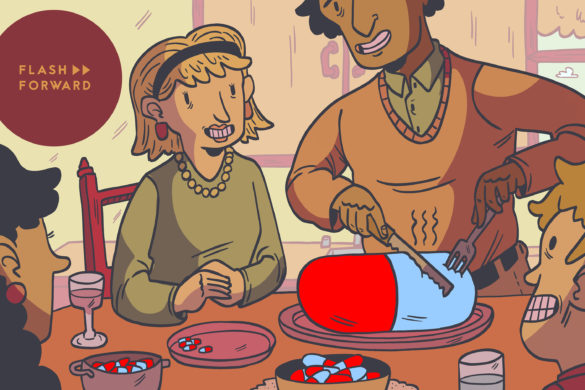

1 comment
this is my first time here and listening this and honestly, I cried the WHOLE TIME. I’m not even sure why but thank you